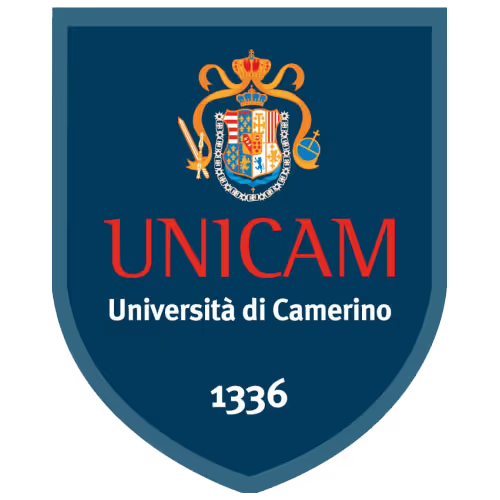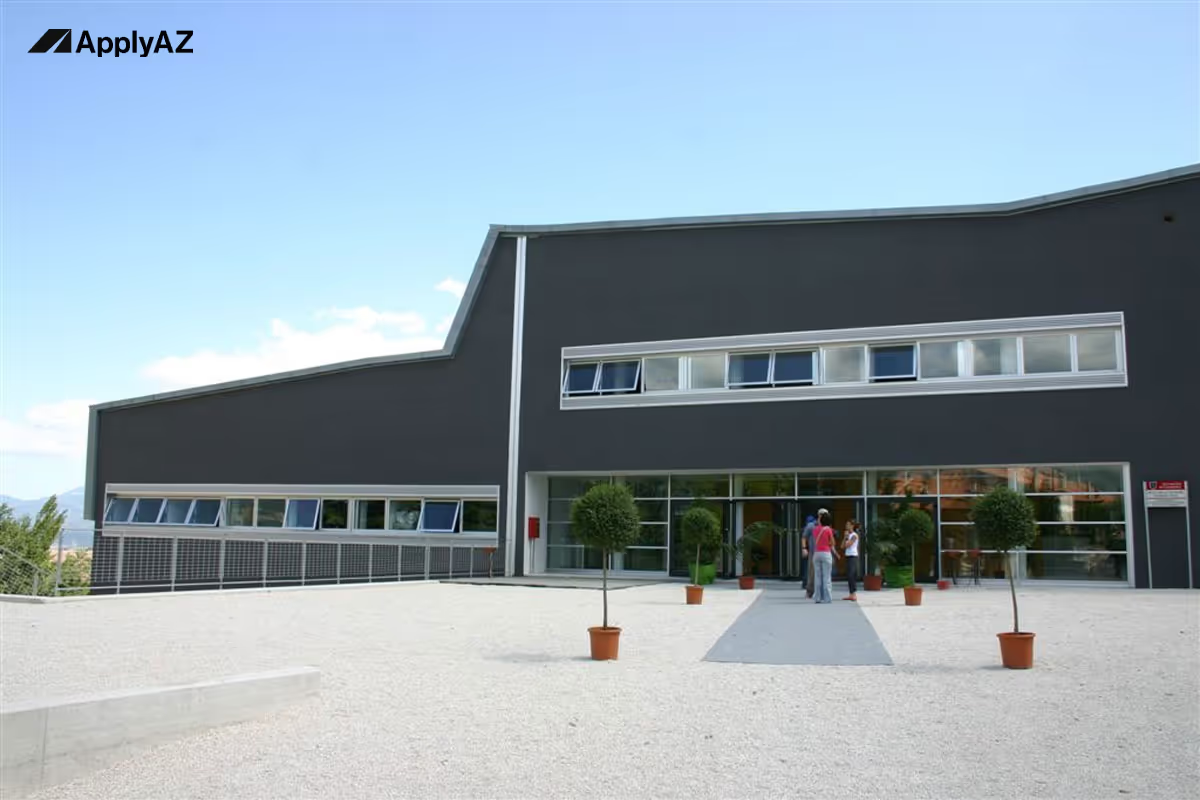Heading
Heading








University of Camerino
A historic campus with modern research ambitions
Founded in 1336, the University of Camerino is one of Europe’s oldest public institutions. Despite its age, the university keeps pace with global innovation through five specialised schools: Architecture and Design, Biosciences and Veterinary Medicine, Law, Pharmacy, and Science and Technology. International rankings often highlight its research impact in chemistry and computer science, while the teaching environment earns high student‑satisfaction scores. Several master’s degrees now run fully in English, adding to the growing list of English‑taught programs in Italy and giving you the chance to study in Italy in English while paying regulated state fees.
Academic highlights
- Chemistry and Advanced Materials laboratories recognised by European research councils.
- Computer Science department leading Horizon projects on cybersecurity and artificial intelligence.
- Veterinary Medicine hospital offering hands‑on clinical rotations with small and large animals.
- Architecture school nestled in a UNESCO‑listed region, perfect for heritage‑restoration studies.
Living and learning in Camerino
Camerino is a small medieval town in the Marche region. Its compact size means lecture halls, dorms, cafés, and sports facilities all sit within a fifteen‑minute walk. With roughly 6,000 residents and 8,000 students, the local economy welcomes student life. Rents for shared flats average €200–€250 per month, and university cafeterias serve balanced meals for under €4. The Apennine setting keeps summers warm (about 28 °C) and winters cool but sunny (around 4 °C), ideal for hiking or skiing between study blocks. Buses link the town centre to railway hubs, and a discounted student pass covers regional travel.
Cultural events—classical concerts in Renaissance halls, food festivals celebrating truffles and olives, and weekend language exchanges—make it easy to integrate. Because classes are in English, international students quickly build mixed friendship groups, then pick up conversational Italian during everyday errands.
Job prospects and internships
While Camerino itself is small, its network of partnerships spans the Marche manufacturing belt and national research centres. Key sectors include:
- Pharmaceuticals and biotech – regional plants host internships for pharmacy and chemistry students.
- Agri‑food technology – nearby companies refine food‑quality analytics and sustainable packaging.
- Advanced manufacturing – robotics and composite‑material firms collaborate with engineering labs on Industry 4.0 projects.
- Digital services – local start‑ups use cloud and AI solutions, offering roles for computer‑science graduates.
Internship agreements allow you to earn thesis credits and apply classroom theory to real problems. Many positions accept English as the working language and pay modest stipends, easing living costs. After graduation, alumni find roles across Italy and wider Europe, helped by the university’s career office and Erasmus+ research networks.
Funding and scholarships
Being part of public Italian universities, Camerino keeps tuition predictable—generally €900–€2,000 a year depending on household income. International applicants can compete for the DSU grant, which may waive fees entirely, provide rent support, and add a yearly stipend of up to €7,000. Merit scholarships for high GPA or language scores further reduce expenses, making the overall package competitive with tuition‑free universities Italy references.
Why choose Camerino
- Intimate learning: small cohorts mean professors know your name and guide your research closely.
- Cost advantage: affordable housing, DSU grant opportunities, and low campus fees.
- Research access: modern labs open to master’s students from the first semester.
- Lifestyle balance: safe town, clean air, mountain sports, and rich cultural heritage.
Finish your classes on Friday, hike the Sibillini peaks on Saturday, and present your polymer‑science poster at a European conference on Monday—that’s the Camerino rhythm.
In two minutes we’ll confirm whether you meet the basic entry rules for tuition-free, English-taught degrees in Italy. We’ll then quickly see if we still have space for you this month. If so, you’ll get a personalised offer. Accept it, and our experts hand-craft a shortlist of majors that fit your grades, goals, and career plans. Upload your documents once; we submit every university and scholarship application, line up multiple admission letters, and guide you through the visa process—backed by our admission-and-scholarship guarantee.
Biological Sciences (LM‑6) at University of Camerino
1. Why choose this English‑medium life‑science degree?
The planet faces health crises, biodiversity loss, and resource stress. Skilled biologists who can connect molecular data with global policy are therefore in high demand. Among the growing list of English‑taught programs in Italy, the Biological Sciences LM‑6 at Camerino stands out. You will study in Italy in English, enjoy the low fees typical of public Italian universities, and apply for funding streams—such as the DSU grant and other scholarships for international students in Italy—that can lower your costs to levels seen at some tuition‑free universities Italy promotes. The course blends molecular biology, ecology, and applied biotechnology over two years (120 ECTS) and culminates in a research thesis designed for journal submission.
2. Curriculum map: from genes to ecosystems
Year 1 – core foundations
- Advanced Molecular Biology: chromatin dynamics, non‑coding RNAs, CRISPR technology; weekly labs on plasmid design.
- Cell Physiology: membrane trafficking and signal transduction with confocal‑microscopy workshops.
- Biostatistics and Bioinformatic Tools: R, Python, and machine‑learning basics for –omics data.
- Environmental Microbiology: soil and water microbe interactions; field protocols for sampling and DNA barcoding.
- Elective A (6 ECTS): choices include Marine Biodiversity, Plant Pathology, or Biochemistry of Natural Products.
Year 2 – specialisations and thesis runway
- Genomics and Proteomics: next‑generation sequencing, mass spectrometry, and systems‑biology networks.
- Conservation Biology and Wildlife Management: population modelling, genetic diversity metrics, and IUCN criteria.
- Biotechnology for Health and Industry: recombinant protein production, vaccine platforms, and GMP guidelines.
- Research Internship (18 ECTS): 450 hours in a laboratory or biotech firm; outputs feed thesis data sets.
- Elective B (6 ECTS): options include Bioinformatics of Human Disease, Ecotoxicology, or Agro‑Biotech.
- Master’s Thesis (30 ECTS): original research under faculty supervision—topics range from CRISPR editing for fungal resistance to drone‑aided wildlife census.
3. Active learning: how theory meets practice
Lecturers release concise video primers before class so contact hours focus on problem‑solving. Small cohorts—about 25 students—enable round‑table discussions and live data analyses. Weekly deliverables include:
- Git‑based code reviews on R scripts for differential‑expression studies.
- Poster‑style presentations where peers critique experimental design.
- Field logs from biodiversity surveys, summarised in under 80‑word entries.
- Mini‑grants written in plain English to practise funding pitches.
By focusing on actionable tasks every week, you internalise complex vocabulary and laboratory etiquette without feeling overwhelmed.
4. Research infrastructure: modern tools for ambitious projects
- Next‑Generation Sequencing Core – Illumina and Oxford Nanopore platforms, plus automated library prep.
- Proteomics Suite – LC‑MS/MS instruments, MALDI ion sources, and data‑processing workstations.
- Ecology Field Station – controlled plots and remote sensors tracking micro‑climate and soil nutrients.
- Bioinformatics Hub – 200 GPU nodes running Galaxy, BLAST, and Cytoscape.
- Biosafety Level 2 Labs – culture rooms equipped for pathogenic studies and CRISPR editing.
Access begins in semester one after safety induction. Booking uses an English‑language portal so international students navigate resources easily.
5. Internship pathways: bridging campus and workplace
Camerino’s School of Biosciences partners with:
- Regional biotech companies producing probiotic supplements.
- National research agencies studying Alpine ecosystem shifts.
- Veterinary diagnostics labs validating PCR assays for zoonotic diseases.
- EU‑funded consortia mapping plant–pathogen interactions with CRISPR.
Internship supervisors publish co‑authored abstracts with students at EMBO and Society for Conservation Biology meetings, boosting employability and citation profiles.
6. Funding routes: DSU grant plus extra support
DSU grant highlights
- Eligibility: EU and non‑EU students within income thresholds.
- Benefits: tuition waiver, rent subsidy, meal vouchers, up to €7 000 stipend.
- Renewal: secure at least 30 ECTS and maintain passing marks.
Additional scholarships for international students in Italy
- Merit‑based fee cuts for top GPA or GRE scores.
- Teaching assistantships paying hourly for laboratory prep and tutoring.
- Erasmus+ stipends covering semester exchanges in Sweden or Germany.
- Research bursaries tied to Horizon Europe projects in biotech or ecology.
Together, these layers can rival tuition‑free universities Italy lists while maintaining robust lab access.
7. Career trajectories and graduate success
A departmental survey shows 93 % employment or PhD placement within six months. Alumni paths include:
- PhD candidates at EMBL, Max Planck, and Imperial College.
- Field ecologists for NGOs monitoring Mediterranean biodiversity.
- Bioinformatics analysts in pharma companies decoding rare‑disease genomes.
- Science communicators crafting policy briefs on sustainable agriculture.
Employers note graduates’ mix of laboratory competence, coding literacy, and clear English reporting—hallmarks of the programme’s teaching design.
8. Admissions made clear
- Bachelor’s in biology, biotechnology, or environmental science (180 ECTS).
- English proof: IELTS 6.5, TOEFL 90, or prior English‑medium degree.
- Prerequisites: cell biology, genetics, chemistry, and basic statistics.
- Online interview: 20 minutes on motivation, lab habits, and problem‑solving scenarios.
9. Why this LM‑6 belongs on your shortlist
- English‑taught modules ensure seamless global collaboration.
- Affordable fees offset by DSU grant opportunities.
- Hands‑on culture in modern genomics and ecology labs.
- Small‑town focus promotes safety, community, and mentorship.
- Strong research links yield early publications and conference slots.
- Versatile curriculum lets you pivot between biomedical and environmental careers.
With these strengths, Camerino’s Biological Sciences LM‑6 stands out among English‑taught programs in Italy for students seeking comprehensive life‑science training without financial strain.
Ready for this programme?
If you qualify and we still have a spot this month, we’ll reserve your place with ApplyAZ. Our team will tailor a set of best-fit majors—including this course—and handle every form and deadline for you. One upload, many applications, guaranteed offers, DSU grant support, and visa coaching: that’s the ApplyAZ promise. Start now and secure your spot before this month’s intake fills up.

They Began right where you are










